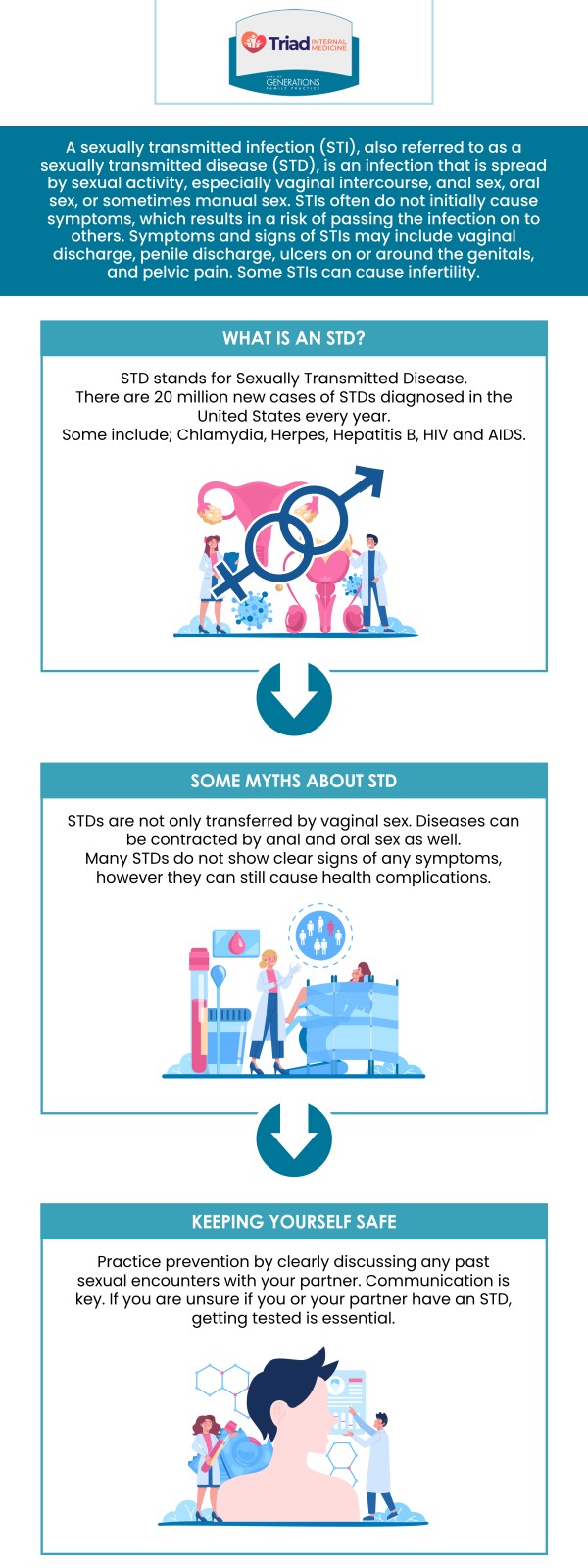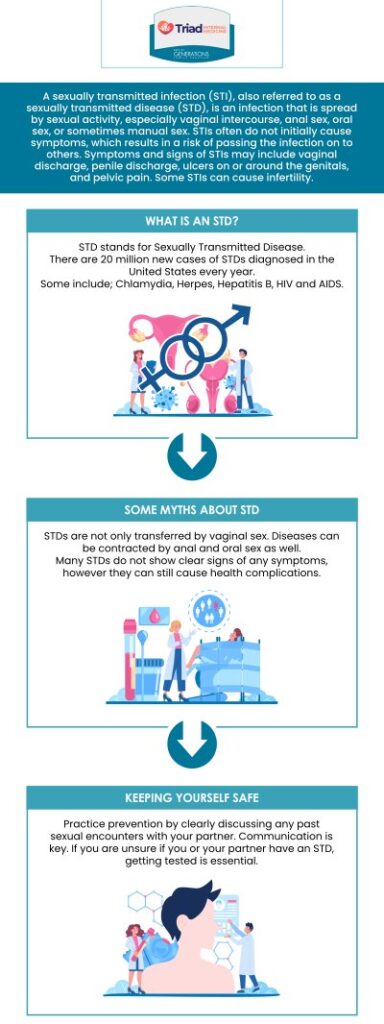Common STDs and How to Prevent Them
Common sexually transmitted diseases (STDs) include chlamydia, gonorrhea, syphilis, and herpes, each with unique symptoms and risks. Preventing STDs involves using condoms, getting regular screenings, and maintaining open communication with sexual partners. Vaccinations, such as the HPV vaccine, also play a crucial role in reducing the risk of certain STDs. For more information, please contact us or book an appointment online. We are conveniently located at Dublin Square and Mack Road in Asheboro, NC.


Sexually transmitted diseases (STDs) are common, but you can protect yourself! Take a minute to learn more about some of the most common STDs and the ways you can stop an infection before it starts.
If you or someone you know has tested positive for a sexually transmitted disease (STD), you aren’t alone. More than one million adults acquire an STD every day across the world, and every year over 20 million new cases of STDs are reported in the US.
Fortunately, many STDs are treatable when caught in their early stages. This is why getting screened for STDs regularly is critical for all sexually active people. Getting tested regularly can help keep you and your sexual partner(s) healthy and safe.
As part of our comprehensive internal and primary care at Triad Internal Medicine, our providers help sexually active people in Asheboro, North Carolina, protect their health with STD screenings and treatment. Keep reading to learn about STD prevention and the most common STDs.
Preventing STDs
STDs are infections usually spread through sexual intercourse but may also be transmitted by oral, anal, or vaginal contact. Therefore, the only true guarantee against STDs is abstinence. This is not practical for most people, so there may always be some risk of contracting an STD.
Fortunately, you can take steps to protect yourself against STDs. First, always use condoms for protection during intercourse. Though you or your partner may have a different form of birth control, condoms are the only form of contraception that helps protect you from STDs.
Next, get tested for STDs routinely. Testing is recommended for all sexually active people, regardless of age or gender. Your provider may recommend testing more frequently if you are a pregnant woman, sexually active gay or bisexual man, or if you have multiple sexual partners or share drug needles.
Finally, practice open communication with your sexual partner(s) and your medical team. Honest discussion of your sexual history can help reduce your risk of spreading or getting an STD.
Common STDs
STDs can be contracted by anyone, regardless of age, sexual orientation, or marital status. Let’s review some of the most common STDs:
Gonorrhea
Gonorrhea is a bacterial infection transmitted during oral, anal, and vaginal sex. This STD rarely has any symptoms. When symptoms do appear, they may be mistaken for other issues like a bladder infection.
For women, untreated gonorrhea can impact their ability to have children and may cause other damage to reproductive health. If you are a woman and experience any of the following symptoms, set up an appointment with your Triad Internal Medicine provider for screening and treatment:
- Swelling of the vulva
- Spotting or irregular bleeding
- Pain during sex
- Spotting after sex
- Abdominal or pelvic pain
- Burning when you urinate
Gonorrhea is treated with dual therapy (two types) of antibiotics to be successful.
Chlamydia
Chlamydia is another, highly contagious bacterial infection that is transmitted the same way gonorrhea is. Chlamydia is quite common, with about 3 million cases in the US each year.
Untreated chlamydia in women can cause pelvic inflammatory disease (PID), which may cause infertility, and pregnant women can pass the infection to their baby. Chlamydia is often unnoticed and asymptomatic in the early stages.
The first symptoms are often burning during urination and/or discharge from the penis or vagina. Other symptoms may appear two to three weeks after infection and include:
- Pain during intercourse
- Yellow discharge
- Rectal pain, bleeding, or discharge
- Burning or pain when you pee
- Spotting after sex or between periods (for women)
Chlamydia is treated with antibiotics, and it is possible to get chlamydia multiple times.
Herpes
The herpes simplex virus comes in two types, both viral infections from sexual contact or kissing, which causes sores to appear. HSV-1 causes sores on and around the mouth, and HSV-2 causes sores on and around the genitals.
Symptoms may appear after a few days of infection, but many people go months or years before symptoms develop. These symptoms include:
- Blisters in the genital area, mouth area, anus, thighs, or buttocks, which may pop or become open sores before scabbing over
- Fever
- Fatigue
- Body/muscle aches
- Painful/swollen lymph nodes
Herpes cannot be treated with antibiotics since it is a virus, and there is no known cure. However, antiviral medication helps speed the healing of blisters and can reduce flare-ups.
Human papillomavirus (HPV)
HPV is an extremely common viral infection. There are more than 40 types of HPV that usually have no symptoms. However, HPV can be dangerous for women as it may cause cervical cancer.
If you are a woman, your Triad Internal Medicine provider tests for HPV during your routine Pap smear. Fortunately, vaccines can protect you against different strains of HPV, and most HPV infections are harmless and self-resolve.
If you’d like to learn more about STDs and how to prevent them, set up an appointment with the team at Triad Internal Medicine. Give us a call or book an appointment online. We serve patients from Asheboro NC, Redding Hills NC, Greensboro NC, Randleman, NC, Sophia NC, Grays Chapel NC, and surrounding areas.
Check Out Our 5 Star Reviews



Additional Services You May Need
▸ Annual Physical Exam
▸ Internal Medicine
▸ Primary Care
▸ Chronic Diseases
▸ Immunizations
▸ Lab Testing
▸ Acute Illness
▸ STD Testing
▸ Flu Shots
▸ COVID-19 Testing
▸ Women’s Health
▸ Dot Physical
▸ Walk in Clinic
▸ X-ray
▸ Urgent Care
▸ Preventative Medicine
▸ Immigration Physical Exams
▸ Trigger Points
▸ Joint Injections
▸ Telehealth
▸ Medical Weight Loss
▸ Addiction Treatment



